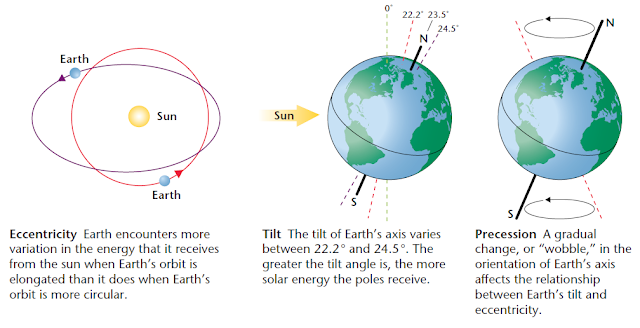Going Haywire
Due to the Earth's axis & position relative to the Sun, as explained in the theory of Milankovitch Cycles, the Earth will naturally warm as we approach the interglacial maximum (period of time between 2 glacial periods) of the Holocene Epoch (the current interglacial period we are in).
 |
| Milankovitch Cycles explained http://gulfcoastcommentary.blogspot.co.uk/2013/11/what-causes-ice-ages.html - grahamhancock.com origin |
Here's a link to a BBC video you can watch whilst you let that last statement sink in a little bit.
This video portrays just how interlinked each aspect of the Earth is. All individual parts can be isolated but, much like cogs in a machine, depend upon each other to perform an action.
All the changes we have seen in the Earth's temperatures and ice sheets occur as a natural process and have done for billions of years before our existence. And when you think about it, life has survived through these tough times - so surely life will find a way and do it again?
Well, maybe not.
The problem is, we are accelerating these events way, way above the normal speed. The rate at which we chuck greenhouse gases into the atmosphere, along with other synthetic substances such as CFC's that damage our ozone, result in the once predictable natural cycles of the Earth going haywire. The natural process is being disturbed and, just like a 7 year old that doesn't get there way, can become a mass of unpredictable catastrophes.
The average temperature rise is 5°C above pre-industrial levels for the end of this century. 90% of that heat will get trapped in the oceans and cause them to expand. Glaciers will melt, reducing the albedo, and consequently melt faster. NASA collates the data, giving us the facts which we can choose to change:
The estimated total loss of Greenland's glacier is in the range of "200 to more than 300 gigatons per year" & "1 gigaton is approximately 264 billion gallons of water being unloaded into our oceans". If we're a bit optimistic and presume that it unloaded 200 gigatons one year, that's around 240033552000000 litres of water unloaded into our oceans in one year.
| Elephant Foot Glacier, Greenland http://www.danlikesthis.info/2013/12/elephant-foot-glacier-greenland/ |
"Studies (of Greenland's glacier) suggest that its melt grew from 0.09 millimeters per year between 1992 and 2001, expressed as the global sea-level rise equivalent, to 0.59 millimeters per year between 2002 and 2011"
Evolution cannot keep up with this. Smaller organisms like bacteria, they may have a chance, but larger ones, such as tigers, will struggle and so will we (if we keep all genetic modification out of the picture).
We have taken the controls of a world that 99% of us (I guess) do honestly respect. However, we have not shown any respect. But now we can. In fact we've been able to for a long time, yet only now, when we see the devastation to our society in all it's fearfulness that lies ahead, do we decide to make a change. However, let's not dwell on the past any longer. We can make a change now and make these changes for a better future that gets our Earth back on track - to it's natural cycle that we can all cope with.
We can't control the whole world, but we can control how we want to live in it.
H _ M
:)
Bibliography
http://sites.gsu.edu/geog1112/lab-7/
https://sealevel.nasa.gov/


Comments
Post a Comment